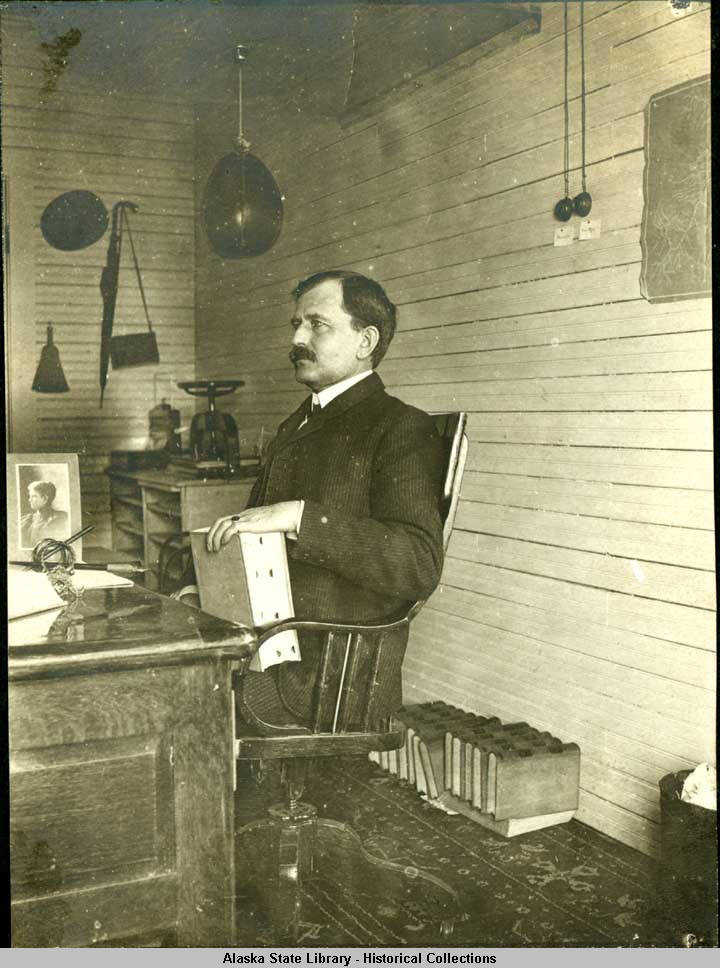A crowd filled the seats at the Rockwell Ballroom in mid-November as Friends of the Juneau-Douglas City Museum hosted Terrence M. Cole for a talk on “Old Yukon: Tales, Trails, and Trials.” Cole, the editor of the memoir by James Wickersham, gave a humorous and commentary-filled presentation on the historical, Alaskan figure and highlighted lesser-known parts of his past.
Wickersham, also known as “The Judge” for his time as a district court judge in Alaska when it was still a territory, had many other notable accomplishments under his belt. He served seven terms as Alaska’s lone delegate to Congress; he wrote legislation that created the Alaska Territorial Legislature; he authored the legislation which established Mount McKinley National Park; and he was responsible for the creation of public institutions like the Alaska Railroad, the public school system and the University of Alaska. He took it upon himself to compile seven volumes of Alaska Law Reports, court decisions made by the District Court Judges in Alaska as well as a bibliography of Alaska literature. He was dedicated even about writing in his diary, which he did every day from Jan. 1, 1900 until 1939, the year he died. His last entry scribbled was “can’t see – blind.”
His memoir, “Old Yukon: Tales, Trails and Trials,” which he wrote on his years as a district judge, failed to publish commercially, Cole said.
“This memoir that he wrote – it was terribly written,” Cole said.
It was too long, boring, and had a number of misremembered events, Cole said, adding that weakness could be due to the passage of time — or because he was a politician. For the release of the memoir, Cole edited, fact-checked and abridged the original. He also added bits of all 47 of Wickersham’s diaries to the memoir to paint a more human and more accurate depiction of Wickersham’s life.
“This is one of Alaska’s great literary treasures,” Cole said of the diaries. “The State Library has transcribed the whole thing. It’s such a great resource and insight into this man … He was a lot more honest and brutal in his diary.”
The main reason Cole decided to edit “Old Yukon: Tales, Trails, and Trials” was because he found the human Wickersham — not the figure — interesting.
Wickersham often got called “Flickering Wick” and was featured in political cartoons in newspapers for his flip-flopping on some issues while in public office. He once famously launched himself at another congressmen for calling him a liar in 1911 and had to be be pulled off the man by his other fellow congressmen. He was passionate and bullheaded, Cole said.
Originally, Cole said, Wickersham didn’t want to come to Alaska for federal appointment. He wanted to be a consul in Yokohama, Japan.
“In his memoir he said he wanted to go to Alaska. That is completely bogus,” Cole said. Wickersham even sent a telegram to his friend he helped elect to the U.S. Senate, Addison G. Foster, which read: “Much prefer Japan, but leave everything to you.”
Still, as history shows, he made the most of the situation and accomplished quite a deal. But not everything he accomplished during his life is something people today can look back on and praise.
Cole showed a photo of Wickersham with the Committee of Fifteen, a vigilante group that masterminded the expulsion of the Chinese from Tacoma, and described how proud the men were in the photo as amazing, but a sign of Wickersham being a man of his time.
“[Wickersham] never came to see … that this had been a mistake, but I think that obviously he must have known it, in at least part of his soul later on,” Cole said. “It’s a great thing for history, isn’t it, that of the mistakes people make and the accommodations you have to make in order to accept who you are and what you believe as an individual and as a society.”
There were anti-Chinese sentiments in Juneau too, Cole said.
“It’s a dilemma that we just have to accept in our society, that many times really awful things have been done in American history,” he said. “We don’t make a more perfect union without at least acknowledging this aspect of our history, but also thinking about what does it mean. What does it mean for society to be wrong?”
Cole’s answer? Don’t be certain.
“Because these guys were certain back then,” he said in reference to the Committee of Fifteen, “and they shouldn’t have been certain.”
One thing society was certain about was the value of a woman’s chastity, in other words, virginity. This landed Wickersham into trouble while living in Washington. Cole highlighted this moment, a short period of time in Wickersham’s life that plagued his political career – he was charged with seducing a teenaged woman named Sadie Brantner, brought to court, and found guilty. It was a case he brought up 23 times in his diary.
Mentions of his son Howard are notably absent in his memoir — Howard died while Wickersham was working as a judge in Alaska. However, he is mentioned twice in the diaries, though the section on his death was crossed out; he laments the loss of his son, “the light of his life.” When he reflects on his son’s death years later, he said the loss “left him an old man.”
A significant part of “Old Yukon: Tales, Trails, and Trials” covers his attempt to climb Mount Denali, his travels as a judge, or being for Alaska’s interests and numerous adventures.
“He wasn’t just a politician,” Cole said. “He really lived a well-rounded, full life and got the most out of it.”
“Old Yukon” is available through the University of Chicago Press, University of Alaska Press as well Amazon in print as well as a Kindle version and available locally at Hearthside Books.
• Contact reporter Clara Miller at clara.miller@morris.com.

